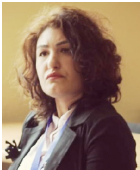STUDENT MOBILITY IN HIGHER EDUCATION – RESEARCH OF STUDENT ACCESS TO EXCHANGE PROGRAMS IN EAST GEORGIA FROM A GENDER POINT OF VIEW
Main Article Content
Abstract
While integration into the European Union is one of the priorities of Georgia,internationalization of higher educational institutions and international student mobility is of a particular importance. The present paper serves exactly this purpose and outlines the preliminary assumption that gender stereotypes, cultural aspects and family traditions have a negative impact on students’ equal access to student exchange programs in Georgia. The mentioned problem refers mainly to woman, who cannot decide the issue of their participation in exchange programs alone, without their family’s involvement. The study revealed that the participation of girls in exchange programs especially increases year by year,while a tendency of slight increase of the number of men is demonstrated. The mentioned is in absolute coincidence with the events in Europe, where female participation has exceeded men’s participation long ago. In the light of the fact that this issue has never been studied before, the present paper may somewhat complement the gap in literature or build a foundation for the research in this field, as it discusses the individual factors of refusal to participate in exchange programs by girls, as well as interruptive and hindering circumstances, which in most cases come from family.
Article Details

This work is licensed under a Creative Commons Attribution 4.0 International License.
References
ACKERS L. (2008): Internationalisation, Mobility and Metrics: A New Form of Indirectc Descrimination? In:
Minerva, Volume 46, Issue 4.
BÖTTCHER L., ARAÙJO, N. A. M., NAGLER J., MENDES J. F. F., HELBING D., HERRMANN H. J. (2016):
Gender Gap in the ERASMUS Mobility Program. PLoS ONE 11(2): e0149514. https://doi.org/10.1371/journal.
pone.0149514
BRANDENBURG U., DE WIT H. (2011): The End of Internationalization. In: International Higher Education. No
Center for International Higher Education, Boston College, Boston.
CENTER FOR CIVIL INTEGRATION AND INTER-ETHNIC RELATIONS (2014): Research of Intercultural
Education Aspects of Teacher Education Programs at Georgian Higher Education Institutions, Tbilisi.
CRESWELL, J.W. (2012): Educational Research. Planning, Conducting, and Evaluating Quantitative and
Qualitative Research, Boston et al.
DE WITH. (2011): Globalisation and Internationalisation of Higher Education. RUSC VOL. 8 No 2. Universitat
Oberta de Catalunya, Barcelona.
DE WIT H. (2013): An Introduction to Higher Education. Center for Higher Education Internationalisation,
Universitã Cattolica del Sacro Cuore, Milan.
EUROSTUDENT (2016): Intelligence Brief No. 2. What are the Obstacles to Students Mobility During the Decision
and Planning Phase? https://www.eurostudent.eu/download_files/documents/EV_IB_mobility_obstacles.pdf
EUROPEAN COMMISSION (2012): Higher Education in Georgia. (2012). Tempus. Retrieved January, 2017,
http://erasmusplus.org.ge/files/publications/Georgia%20Country%20Fiche%202012%20-%20en.pdf
EUROPEAN COMMISSION (2016): Annual Report 2016 Erasmus+.
EUROPEAN COMMISSION (2014): Erasmus Facts, Figures & Trends. The European Union support for student
and staff exchanges and university cooperation in 2012-2013. https://ec.europa.eu/assets/eac/education/
library/statistics/erasmus-plus-annual-report_en.pdf
ERASMUS STUDENTS NETWORK TBILISI, Erasmus+ National Office (2014): Erasmus Mundus Mobility
Assessment for 2013-2014.
ERASMUS STUDENTS NETWORK TBILISI, Erasmus+ National Office (2015): Erasmus Survey of Regions for
-2015.
EHEA (2011): Mobility for Better Learning. Mobility Strategy 2020 for the European Higher Education Area.
Working paper.
GORGADZE N. (2016): Gender Equality of Georgia: General context and statistics, Tbilisi.
ekaterine beniaSvili, ian boemi
ganaTlebis internacionalizacia _ aRmosavleT saqarTveloSi
gacvliT programebze studentebis xelmisawvdomobis kvleva genderul WrilSi
samecniero Sromebis krebuli 2019
GRABHER A., WEJWAR P., UNGER M., TERZIEVA B. (2014): Student Mobility in the EHEA. Underrepresentation
in Student Credit Mobility and imbalances in degree mobility. Institute for Advanced Studies, Vienna.
ISAKADZE T., GVIANISHVILI N. (2014). Study of Teachers‘ Knowledge and Attitudes towards Gender Equality.
Training and Research Group Project “Implementing Gender Equality in Schools”, Tbilisi.
KIKNADZE, T., DONADZE, N. (2006): Gender - Social and Political Studies, Tbilisi.
NATIONAL REVIEW of the Implementation of the Beijing Declaration and Platform for Action (2014).
NETZ N., ORR D., GWOSĆ C., HUß B. (2012): What deters students from studying abroad? Evidence from
Austria, Switzerland, Germany, the Netherlands and Poland. Institute of Higher Education, Federal Ministry of
Education and Research of Germany, Bonn.
ORR D. (2015): Where do internationally mobily students come from and where do they go? An Overview of the
Flows of Internationally Mobile Students. http://uis.unesco.org/en/uis-student-flow
STROUT A. H., (2010): Who Plans (Not) to Study Abroad? An Examination of U.S. Student Intent. University of
Massachusetts, Amherst.
TABATADZE S., GORGADZE N. (2013): Research of Intercultural Education Aspects of Elementary Schools in
Georgia. Center for Civil Integration and Inter-ethnic Relations, Tbilisi.
K.M. UHLY, L.M. VISSER & K.S. ZIPPEL (2017): Gendered patterns in international research collaborations in
academia, Studies in Higher Education, 42:4, 760-782, DOI: 10.1080/03075079.2015.1072151
UNITED NATION DEVELOPMENT FUND (2013): The Millennium Development Goals Report. https://www.
un.org/millenniumgoals/pdf/report-2013/mdg-report-2013-english.pdf
WÄCHTERB., LAMQ. K. H., FERENCZI., Eds (2012): Tying It All Together. Excellence, Mobility, Funding and
the Social Dimension in Higher Education. ACA Papers on International Cooperation in Education. Bonn.



